HI6027: Business and Corporate Law Group Case Study Analysis
VerifiedAdded on 2022/11/18
|10
|2280
|432
Project
AI Summary
This document presents a comprehensive analysis of a business and corporate law case study, addressing key legal issues and principles. Part A examines a contract law scenario involving a promotional competition by SOO Burgers, focusing on offer, acceptance, and revocation. It analyzes whether customers Mickey and Brett are entitled to receive a car based on their actions and the competition's rules, referencing relevant case law like Carlill v Carbolic Smoke Ball Co. Part B delves into corporate law, exploring the powers and limitations of a company's managing director, Sarah, concerning a loan from Costello Bank. The analysis covers the Corporations Act 2001 (Cth), particularly sections 125 and 126, and the doctrine of indoor management, as established in Royal British Bank v Turquand. The document assesses the validity of Sarah's actions, the bank's recourse, and the implications of the loan's purpose and Sarah's relationship with the company. The assignment concludes that SOO Burgers is not required to provide the cars and the bank can sue for the loan repayment.
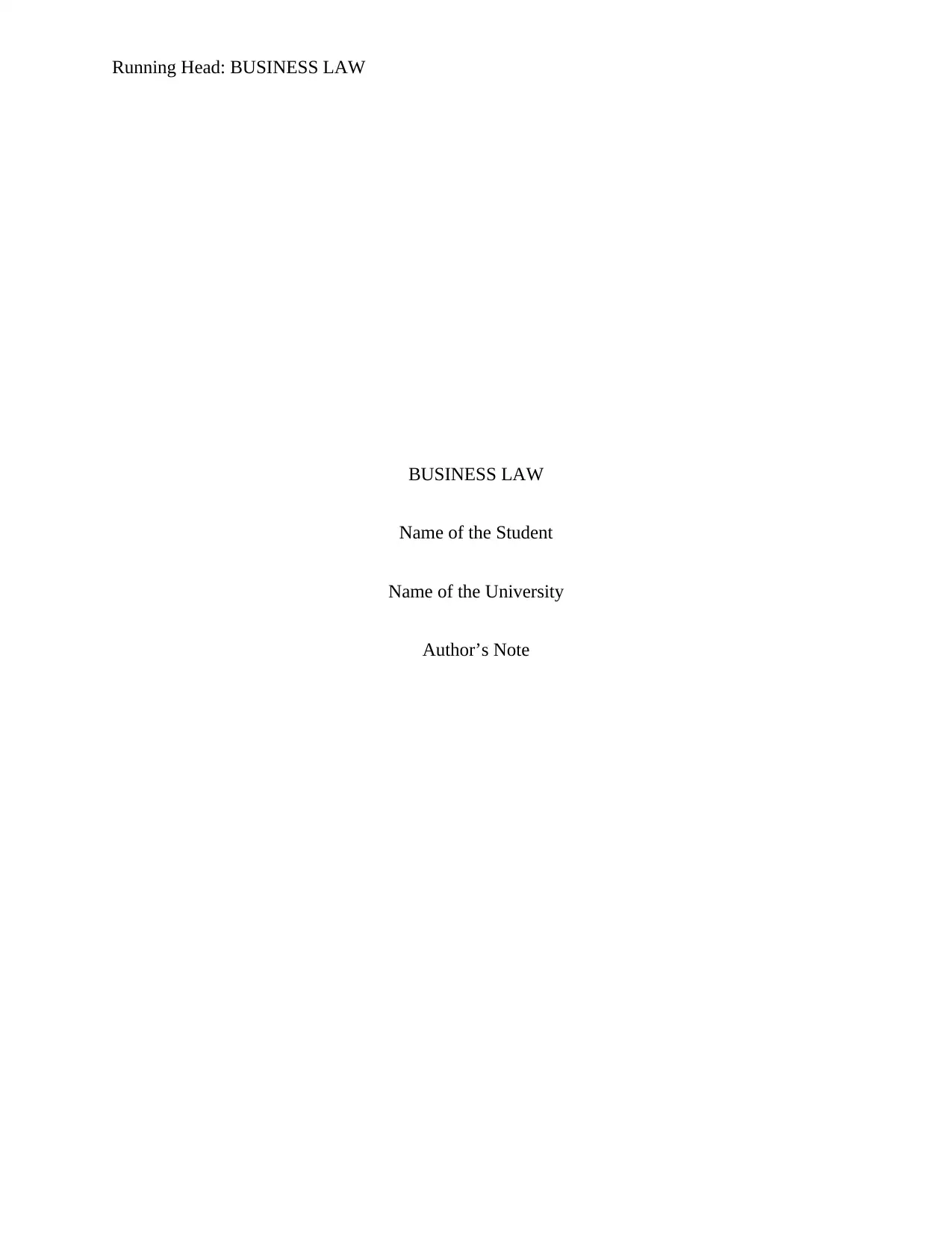
Running Head: BUSINESS LAW
BUSINESS LAW
Name of the Student
Name of the University
Author’s Note
BUSINESS LAW
Name of the Student
Name of the University
Author’s Note
Paraphrase This Document
Need a fresh take? Get an instant paraphrase of this document with our AI Paraphraser
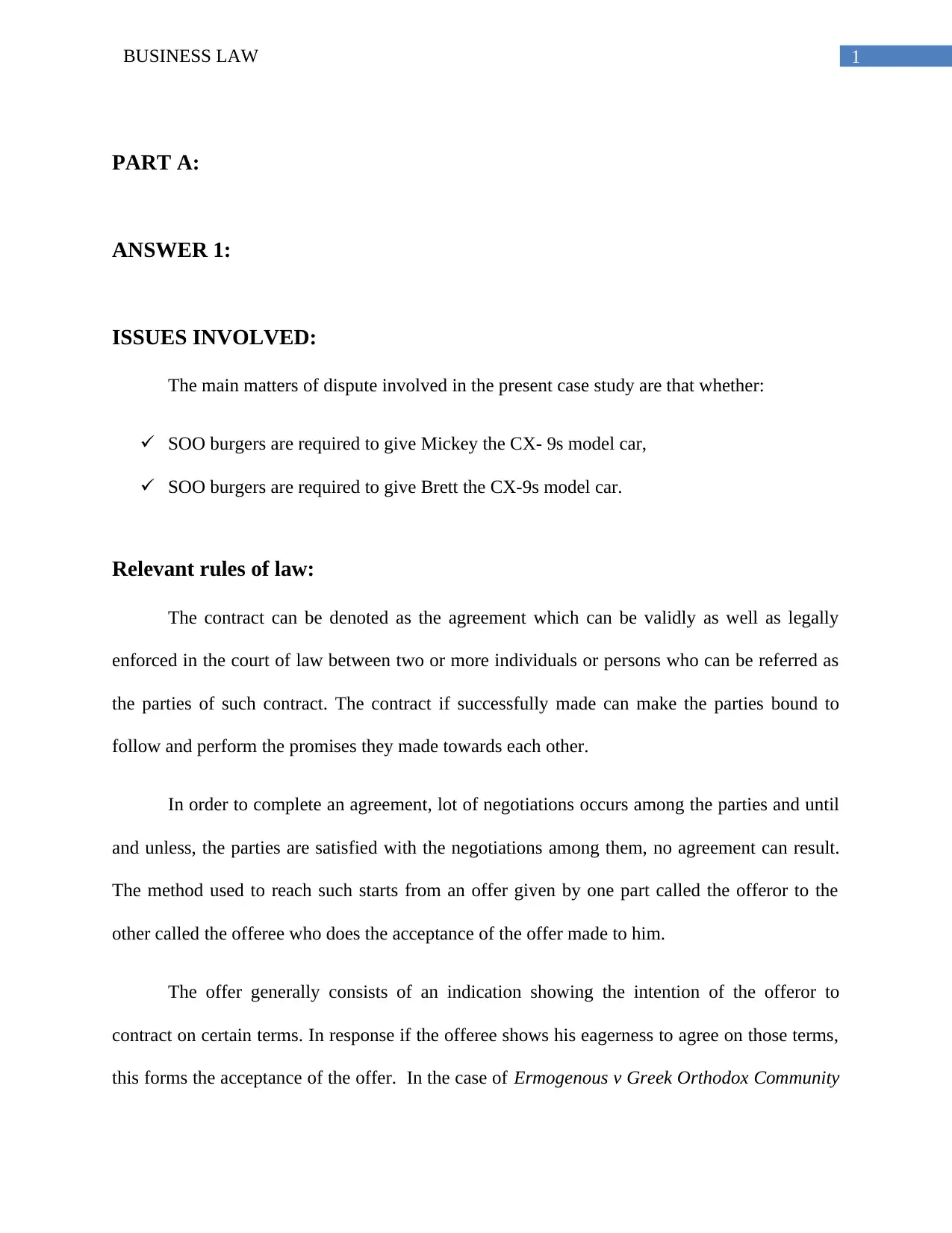
1BUSINESS LAW
PART A:
ANSWER 1:
ISSUES INVOLVED:
The main matters of dispute involved in the present case study are that whether:
SOO burgers are required to give Mickey the CX- 9s model car,
SOO burgers are required to give Brett the CX-9s model car.
Relevant rules of law:
The contract can be denoted as the agreement which can be validly as well as legally
enforced in the court of law between two or more individuals or persons who can be referred as
the parties of such contract. The contract if successfully made can make the parties bound to
follow and perform the promises they made towards each other.
In order to complete an agreement, lot of negotiations occurs among the parties and until
and unless, the parties are satisfied with the negotiations among them, no agreement can result.
The method used to reach such starts from an offer given by one part called the offeror to the
other called the offeree who does the acceptance of the offer made to him.
The offer generally consists of an indication showing the intention of the offeror to
contract on certain terms. In response if the offeree shows his eagerness to agree on those terms,
this forms the acceptance of the offer. In the case of Ermogenous v Greek Orthodox Community
PART A:
ANSWER 1:
ISSUES INVOLVED:
The main matters of dispute involved in the present case study are that whether:
SOO burgers are required to give Mickey the CX- 9s model car,
SOO burgers are required to give Brett the CX-9s model car.
Relevant rules of law:
The contract can be denoted as the agreement which can be validly as well as legally
enforced in the court of law between two or more individuals or persons who can be referred as
the parties of such contract. The contract if successfully made can make the parties bound to
follow and perform the promises they made towards each other.
In order to complete an agreement, lot of negotiations occurs among the parties and until
and unless, the parties are satisfied with the negotiations among them, no agreement can result.
The method used to reach such starts from an offer given by one part called the offeror to the
other called the offeree who does the acceptance of the offer made to him.
The offer generally consists of an indication showing the intention of the offeror to
contract on certain terms. In response if the offeree shows his eagerness to agree on those terms,
this forms the acceptance of the offer. In the case of Ermogenous v Greek Orthodox Community
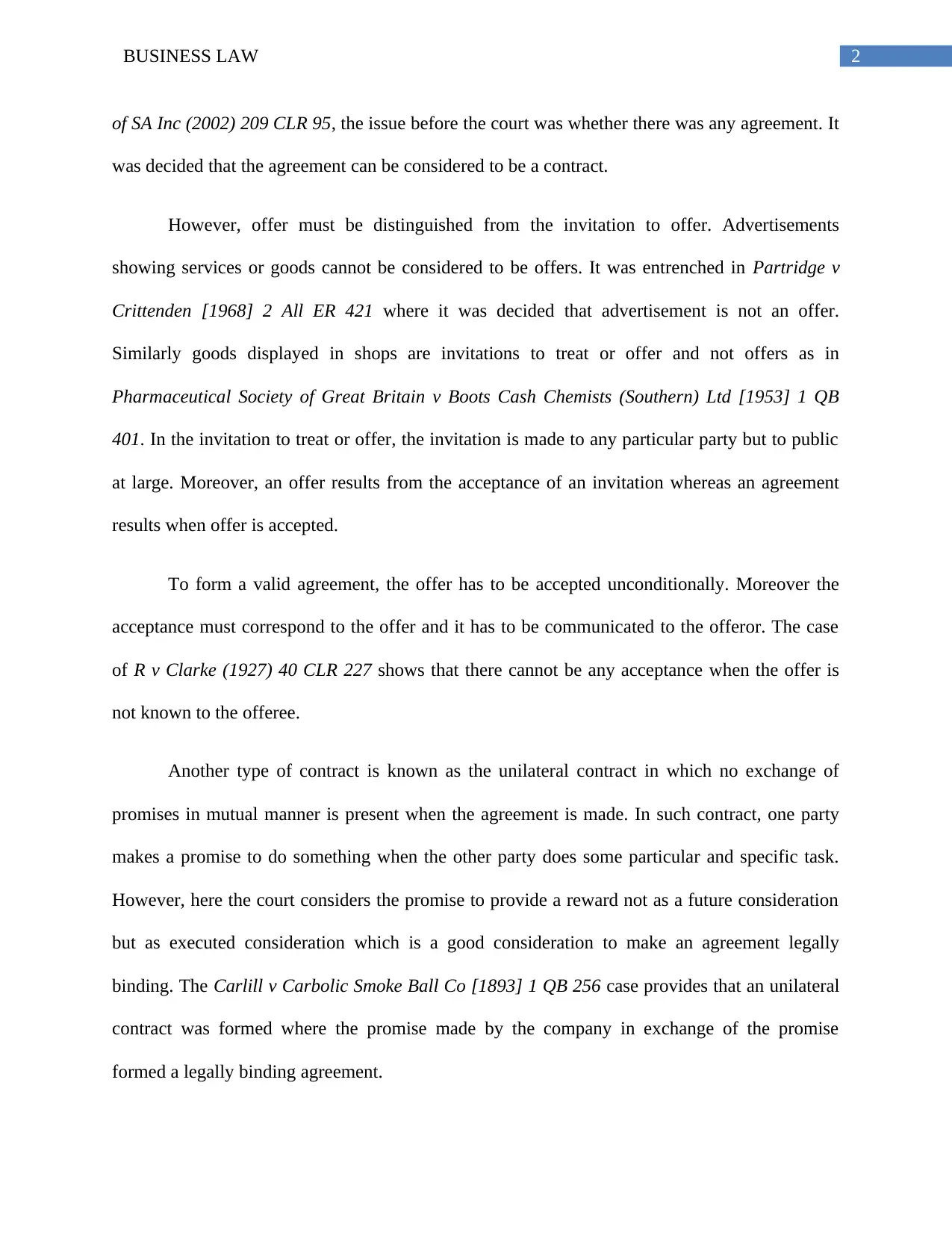
2BUSINESS LAW
of SA Inc (2002) 209 CLR 95, the issue before the court was whether there was any agreement. It
was decided that the agreement can be considered to be a contract.
However, offer must be distinguished from the invitation to offer. Advertisements
showing services or goods cannot be considered to be offers. It was entrenched in Partridge v
Crittenden [1968] 2 All ER 421 where it was decided that advertisement is not an offer.
Similarly goods displayed in shops are invitations to treat or offer and not offers as in
Pharmaceutical Society of Great Britain v Boots Cash Chemists (Southern) Ltd [1953] 1 QB
401. In the invitation to treat or offer, the invitation is made to any particular party but to public
at large. Moreover, an offer results from the acceptance of an invitation whereas an agreement
results when offer is accepted.
To form a valid agreement, the offer has to be accepted unconditionally. Moreover the
acceptance must correspond to the offer and it has to be communicated to the offeror. The case
of R v Clarke (1927) 40 CLR 227 shows that there cannot be any acceptance when the offer is
not known to the offeree.
Another type of contract is known as the unilateral contract in which no exchange of
promises in mutual manner is present when the agreement is made. In such contract, one party
makes a promise to do something when the other party does some particular and specific task.
However, here the court considers the promise to provide a reward not as a future consideration
but as executed consideration which is a good consideration to make an agreement legally
binding. The Carlill v Carbolic Smoke Ball Co [1893] 1 QB 256 case provides that an unilateral
contract was formed where the promise made by the company in exchange of the promise
formed a legally binding agreement.
of SA Inc (2002) 209 CLR 95, the issue before the court was whether there was any agreement. It
was decided that the agreement can be considered to be a contract.
However, offer must be distinguished from the invitation to offer. Advertisements
showing services or goods cannot be considered to be offers. It was entrenched in Partridge v
Crittenden [1968] 2 All ER 421 where it was decided that advertisement is not an offer.
Similarly goods displayed in shops are invitations to treat or offer and not offers as in
Pharmaceutical Society of Great Britain v Boots Cash Chemists (Southern) Ltd [1953] 1 QB
401. In the invitation to treat or offer, the invitation is made to any particular party but to public
at large. Moreover, an offer results from the acceptance of an invitation whereas an agreement
results when offer is accepted.
To form a valid agreement, the offer has to be accepted unconditionally. Moreover the
acceptance must correspond to the offer and it has to be communicated to the offeror. The case
of R v Clarke (1927) 40 CLR 227 shows that there cannot be any acceptance when the offer is
not known to the offeree.
Another type of contract is known as the unilateral contract in which no exchange of
promises in mutual manner is present when the agreement is made. In such contract, one party
makes a promise to do something when the other party does some particular and specific task.
However, here the court considers the promise to provide a reward not as a future consideration
but as executed consideration which is a good consideration to make an agreement legally
binding. The Carlill v Carbolic Smoke Ball Co [1893] 1 QB 256 case provides that an unilateral
contract was formed where the promise made by the company in exchange of the promise
formed a legally binding agreement.
⊘ This is a preview!⊘
Do you want full access?
Subscribe today to unlock all pages.

Trusted by 1+ million students worldwide
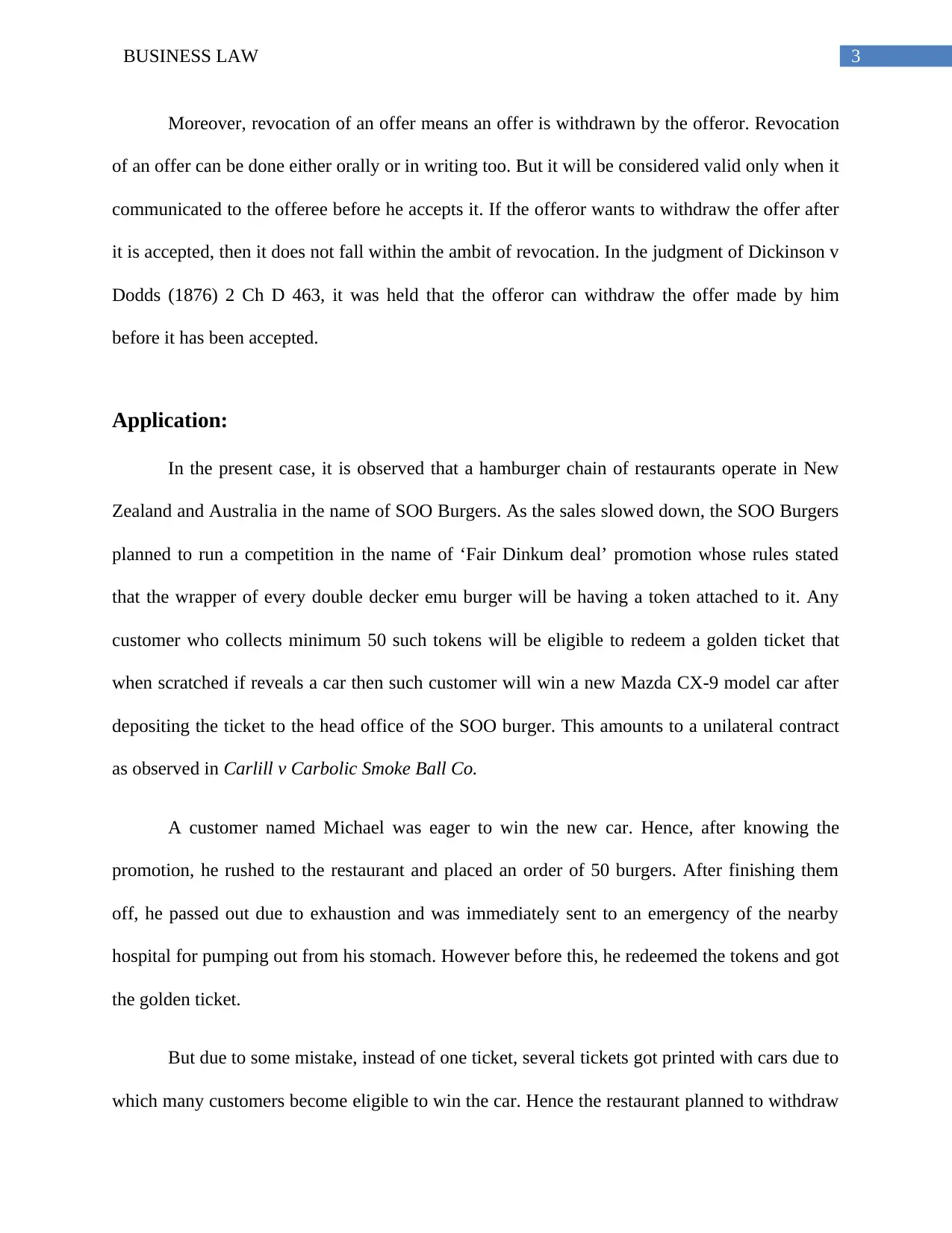
3BUSINESS LAW
Moreover, revocation of an offer means an offer is withdrawn by the offeror. Revocation
of an offer can be done either orally or in writing too. But it will be considered valid only when it
communicated to the offeree before he accepts it. If the offeror wants to withdraw the offer after
it is accepted, then it does not fall within the ambit of revocation. In the judgment of Dickinson v
Dodds (1876) 2 Ch D 463, it was held that the offeror can withdraw the offer made by him
before it has been accepted.
Application:
In the present case, it is observed that a hamburger chain of restaurants operate in New
Zealand and Australia in the name of SOO Burgers. As the sales slowed down, the SOO Burgers
planned to run a competition in the name of ‘Fair Dinkum deal’ promotion whose rules stated
that the wrapper of every double decker emu burger will be having a token attached to it. Any
customer who collects minimum 50 such tokens will be eligible to redeem a golden ticket that
when scratched if reveals a car then such customer will win a new Mazda CX-9 model car after
depositing the ticket to the head office of the SOO burger. This amounts to a unilateral contract
as observed in Carlill v Carbolic Smoke Ball Co.
A customer named Michael was eager to win the new car. Hence, after knowing the
promotion, he rushed to the restaurant and placed an order of 50 burgers. After finishing them
off, he passed out due to exhaustion and was immediately sent to an emergency of the nearby
hospital for pumping out from his stomach. However before this, he redeemed the tokens and got
the golden ticket.
But due to some mistake, instead of one ticket, several tickets got printed with cars due to
which many customers become eligible to win the car. Hence the restaurant planned to withdraw
Moreover, revocation of an offer means an offer is withdrawn by the offeror. Revocation
of an offer can be done either orally or in writing too. But it will be considered valid only when it
communicated to the offeree before he accepts it. If the offeror wants to withdraw the offer after
it is accepted, then it does not fall within the ambit of revocation. In the judgment of Dickinson v
Dodds (1876) 2 Ch D 463, it was held that the offeror can withdraw the offer made by him
before it has been accepted.
Application:
In the present case, it is observed that a hamburger chain of restaurants operate in New
Zealand and Australia in the name of SOO Burgers. As the sales slowed down, the SOO Burgers
planned to run a competition in the name of ‘Fair Dinkum deal’ promotion whose rules stated
that the wrapper of every double decker emu burger will be having a token attached to it. Any
customer who collects minimum 50 such tokens will be eligible to redeem a golden ticket that
when scratched if reveals a car then such customer will win a new Mazda CX-9 model car after
depositing the ticket to the head office of the SOO burger. This amounts to a unilateral contract
as observed in Carlill v Carbolic Smoke Ball Co.
A customer named Michael was eager to win the new car. Hence, after knowing the
promotion, he rushed to the restaurant and placed an order of 50 burgers. After finishing them
off, he passed out due to exhaustion and was immediately sent to an emergency of the nearby
hospital for pumping out from his stomach. However before this, he redeemed the tokens and got
the golden ticket.
But due to some mistake, instead of one ticket, several tickets got printed with cars due to
which many customers become eligible to win the car. Hence the restaurant planned to withdraw
Paraphrase This Document
Need a fresh take? Get an instant paraphrase of this document with our AI Paraphraser
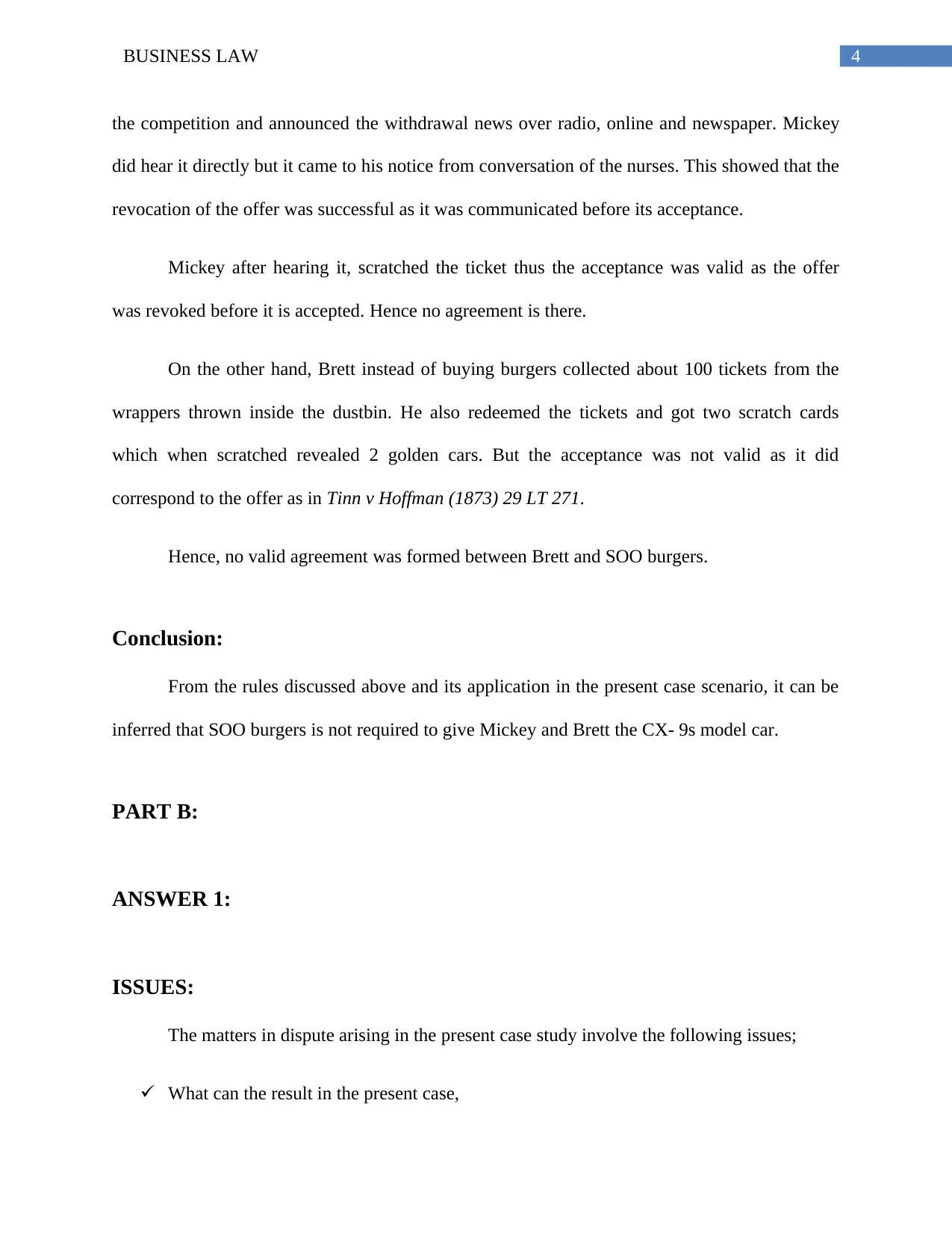
4BUSINESS LAW
the competition and announced the withdrawal news over radio, online and newspaper. Mickey
did hear it directly but it came to his notice from conversation of the nurses. This showed that the
revocation of the offer was successful as it was communicated before its acceptance.
Mickey after hearing it, scratched the ticket thus the acceptance was valid as the offer
was revoked before it is accepted. Hence no agreement is there.
On the other hand, Brett instead of buying burgers collected about 100 tickets from the
wrappers thrown inside the dustbin. He also redeemed the tickets and got two scratch cards
which when scratched revealed 2 golden cars. But the acceptance was not valid as it did
correspond to the offer as in Tinn v Hoffman (1873) 29 LT 271.
Hence, no valid agreement was formed between Brett and SOO burgers.
Conclusion:
From the rules discussed above and its application in the present case scenario, it can be
inferred that SOO burgers is not required to give Mickey and Brett the CX- 9s model car.
PART B:
ANSWER 1:
ISSUES:
The matters in dispute arising in the present case study involve the following issues;
What can the result in the present case,
the competition and announced the withdrawal news over radio, online and newspaper. Mickey
did hear it directly but it came to his notice from conversation of the nurses. This showed that the
revocation of the offer was successful as it was communicated before its acceptance.
Mickey after hearing it, scratched the ticket thus the acceptance was valid as the offer
was revoked before it is accepted. Hence no agreement is there.
On the other hand, Brett instead of buying burgers collected about 100 tickets from the
wrappers thrown inside the dustbin. He also redeemed the tickets and got two scratch cards
which when scratched revealed 2 golden cars. But the acceptance was not valid as it did
correspond to the offer as in Tinn v Hoffman (1873) 29 LT 271.
Hence, no valid agreement was formed between Brett and SOO burgers.
Conclusion:
From the rules discussed above and its application in the present case scenario, it can be
inferred that SOO burgers is not required to give Mickey and Brett the CX- 9s model car.
PART B:
ANSWER 1:
ISSUES:
The matters in dispute arising in the present case study involve the following issues;
What can the result in the present case,
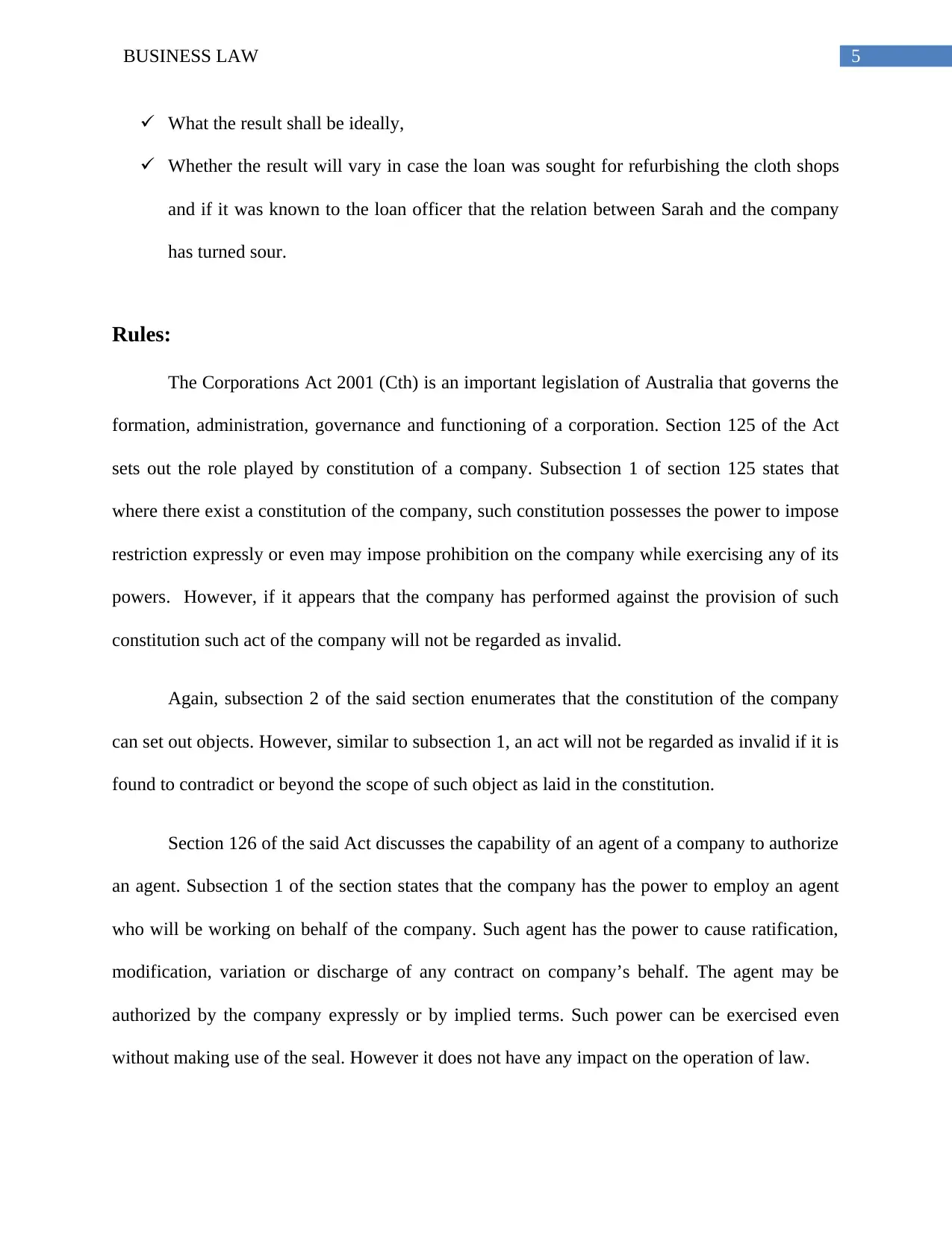
5BUSINESS LAW
What the result shall be ideally,
Whether the result will vary in case the loan was sought for refurbishing the cloth shops
and if it was known to the loan officer that the relation between Sarah and the company
has turned sour.
Rules:
The Corporations Act 2001 (Cth) is an important legislation of Australia that governs the
formation, administration, governance and functioning of a corporation. Section 125 of the Act
sets out the role played by constitution of a company. Subsection 1 of section 125 states that
where there exist a constitution of the company, such constitution possesses the power to impose
restriction expressly or even may impose prohibition on the company while exercising any of its
powers. However, if it appears that the company has performed against the provision of such
constitution such act of the company will not be regarded as invalid.
Again, subsection 2 of the said section enumerates that the constitution of the company
can set out objects. However, similar to subsection 1, an act will not be regarded as invalid if it is
found to contradict or beyond the scope of such object as laid in the constitution.
Section 126 of the said Act discusses the capability of an agent of a company to authorize
an agent. Subsection 1 of the section states that the company has the power to employ an agent
who will be working on behalf of the company. Such agent has the power to cause ratification,
modification, variation or discharge of any contract on company’s behalf. The agent may be
authorized by the company expressly or by implied terms. Such power can be exercised even
without making use of the seal. However it does not have any impact on the operation of law.
What the result shall be ideally,
Whether the result will vary in case the loan was sought for refurbishing the cloth shops
and if it was known to the loan officer that the relation between Sarah and the company
has turned sour.
Rules:
The Corporations Act 2001 (Cth) is an important legislation of Australia that governs the
formation, administration, governance and functioning of a corporation. Section 125 of the Act
sets out the role played by constitution of a company. Subsection 1 of section 125 states that
where there exist a constitution of the company, such constitution possesses the power to impose
restriction expressly or even may impose prohibition on the company while exercising any of its
powers. However, if it appears that the company has performed against the provision of such
constitution such act of the company will not be regarded as invalid.
Again, subsection 2 of the said section enumerates that the constitution of the company
can set out objects. However, similar to subsection 1, an act will not be regarded as invalid if it is
found to contradict or beyond the scope of such object as laid in the constitution.
Section 126 of the said Act discusses the capability of an agent of a company to authorize
an agent. Subsection 1 of the section states that the company has the power to employ an agent
who will be working on behalf of the company. Such agent has the power to cause ratification,
modification, variation or discharge of any contract on company’s behalf. The agent may be
authorized by the company expressly or by implied terms. Such power can be exercised even
without making use of the seal. However it does not have any impact on the operation of law.
⊘ This is a preview!⊘
Do you want full access?
Subscribe today to unlock all pages.

Trusted by 1+ million students worldwide
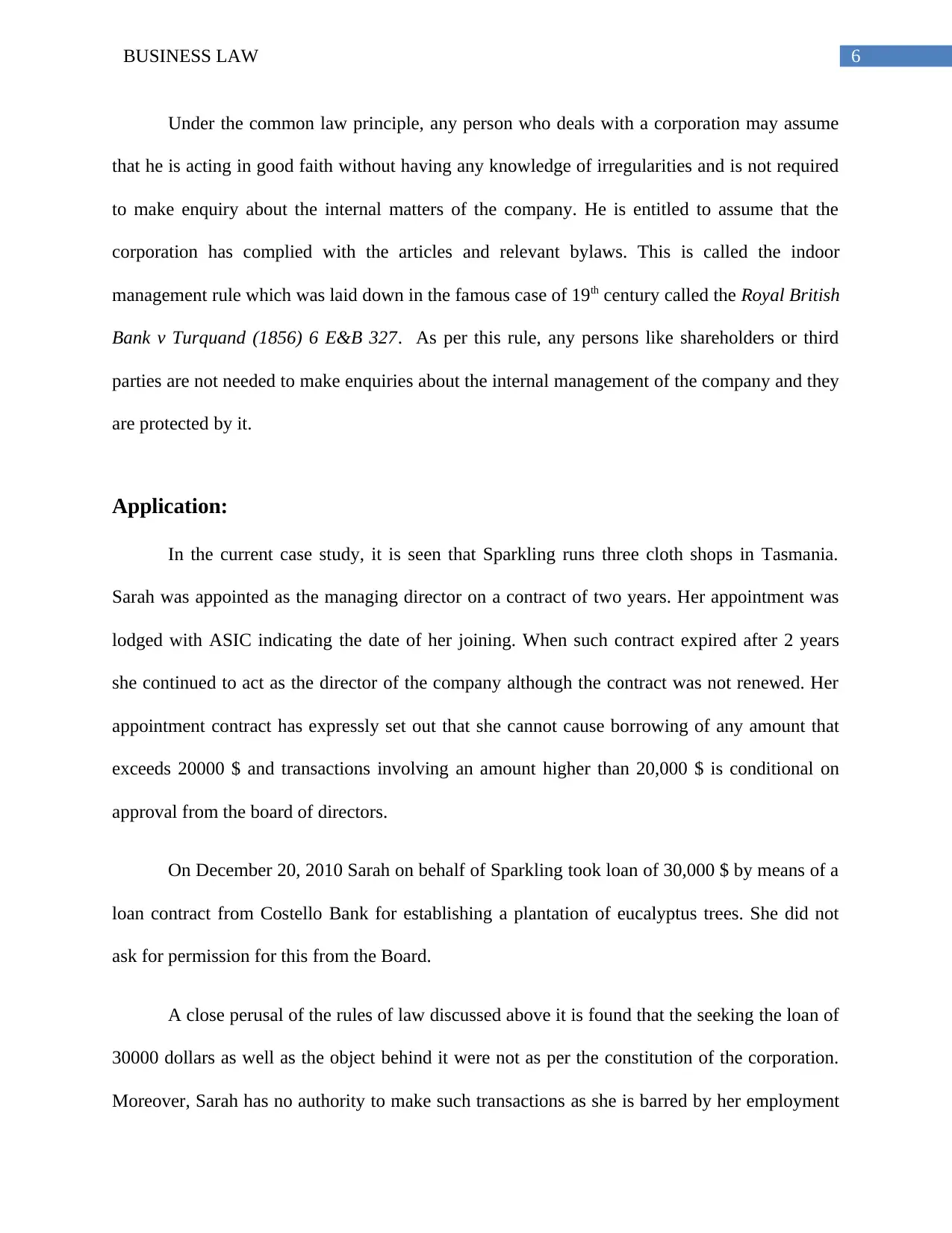
6BUSINESS LAW
Under the common law principle, any person who deals with a corporation may assume
that he is acting in good faith without having any knowledge of irregularities and is not required
to make enquiry about the internal matters of the company. He is entitled to assume that the
corporation has complied with the articles and relevant bylaws. This is called the indoor
management rule which was laid down in the famous case of 19th century called the Royal British
Bank v Turquand (1856) 6 E&B 327. As per this rule, any persons like shareholders or third
parties are not needed to make enquiries about the internal management of the company and they
are protected by it.
Application:
In the current case study, it is seen that Sparkling runs three cloth shops in Tasmania.
Sarah was appointed as the managing director on a contract of two years. Her appointment was
lodged with ASIC indicating the date of her joining. When such contract expired after 2 years
she continued to act as the director of the company although the contract was not renewed. Her
appointment contract has expressly set out that she cannot cause borrowing of any amount that
exceeds 20000 $ and transactions involving an amount higher than 20,000 $ is conditional on
approval from the board of directors.
On December 20, 2010 Sarah on behalf of Sparkling took loan of 30,000 $ by means of a
loan contract from Costello Bank for establishing a plantation of eucalyptus trees. She did not
ask for permission for this from the Board.
A close perusal of the rules of law discussed above it is found that the seeking the loan of
30000 dollars as well as the object behind it were not as per the constitution of the corporation.
Moreover, Sarah has no authority to make such transactions as she is barred by her employment
Under the common law principle, any person who deals with a corporation may assume
that he is acting in good faith without having any knowledge of irregularities and is not required
to make enquiry about the internal matters of the company. He is entitled to assume that the
corporation has complied with the articles and relevant bylaws. This is called the indoor
management rule which was laid down in the famous case of 19th century called the Royal British
Bank v Turquand (1856) 6 E&B 327. As per this rule, any persons like shareholders or third
parties are not needed to make enquiries about the internal management of the company and they
are protected by it.
Application:
In the current case study, it is seen that Sparkling runs three cloth shops in Tasmania.
Sarah was appointed as the managing director on a contract of two years. Her appointment was
lodged with ASIC indicating the date of her joining. When such contract expired after 2 years
she continued to act as the director of the company although the contract was not renewed. Her
appointment contract has expressly set out that she cannot cause borrowing of any amount that
exceeds 20000 $ and transactions involving an amount higher than 20,000 $ is conditional on
approval from the board of directors.
On December 20, 2010 Sarah on behalf of Sparkling took loan of 30,000 $ by means of a
loan contract from Costello Bank for establishing a plantation of eucalyptus trees. She did not
ask for permission for this from the Board.
A close perusal of the rules of law discussed above it is found that the seeking the loan of
30000 dollars as well as the object behind it were not as per the constitution of the corporation.
Moreover, Sarah has no authority to make such transactions as she is barred by her employment
Paraphrase This Document
Need a fresh take? Get an instant paraphrase of this document with our AI Paraphraser
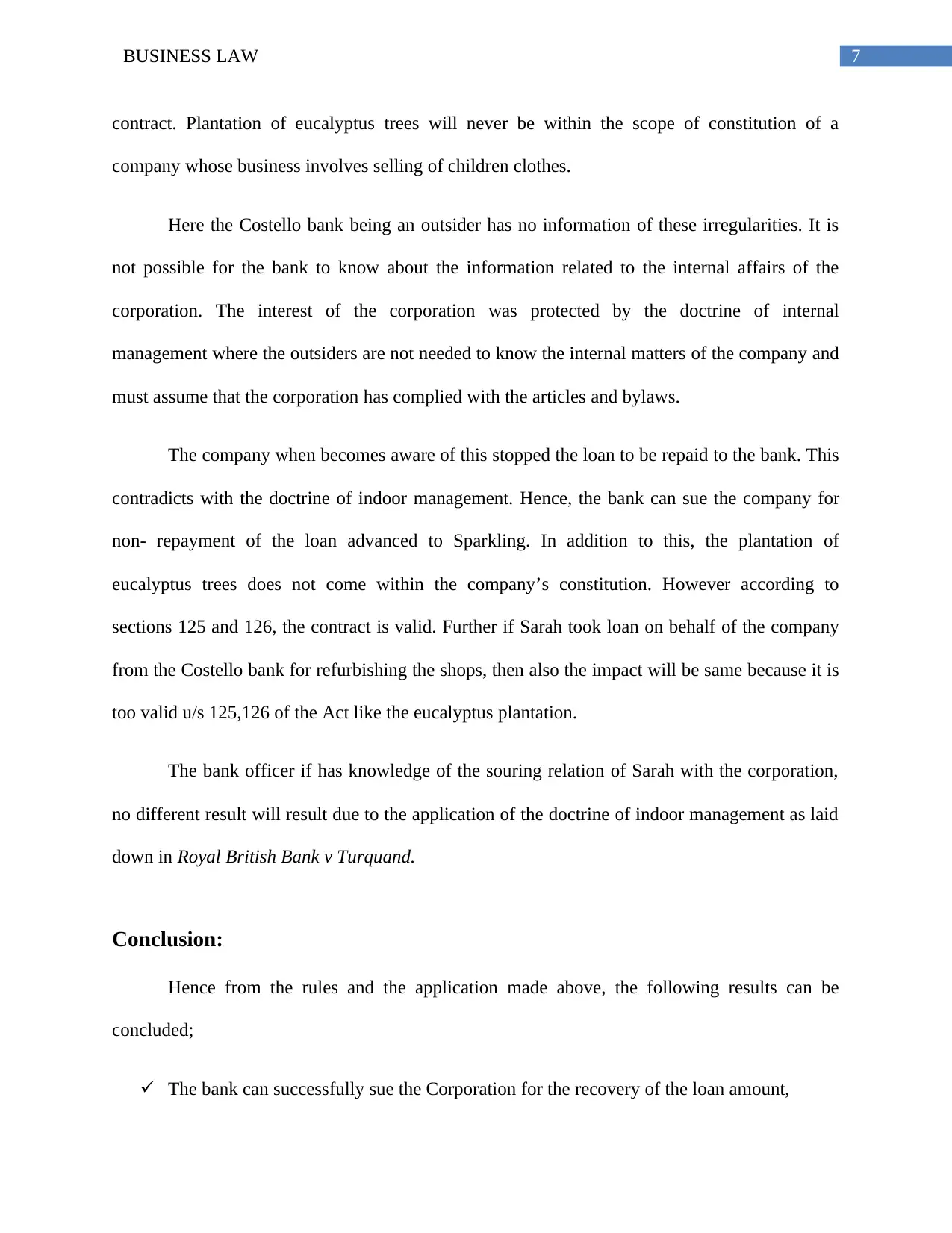
7BUSINESS LAW
contract. Plantation of eucalyptus trees will never be within the scope of constitution of a
company whose business involves selling of children clothes.
Here the Costello bank being an outsider has no information of these irregularities. It is
not possible for the bank to know about the information related to the internal affairs of the
corporation. The interest of the corporation was protected by the doctrine of internal
management where the outsiders are not needed to know the internal matters of the company and
must assume that the corporation has complied with the articles and bylaws.
The company when becomes aware of this stopped the loan to be repaid to the bank. This
contradicts with the doctrine of indoor management. Hence, the bank can sue the company for
non- repayment of the loan advanced to Sparkling. In addition to this, the plantation of
eucalyptus trees does not come within the company’s constitution. However according to
sections 125 and 126, the contract is valid. Further if Sarah took loan on behalf of the company
from the Costello bank for refurbishing the shops, then also the impact will be same because it is
too valid u/s 125,126 of the Act like the eucalyptus plantation.
The bank officer if has knowledge of the souring relation of Sarah with the corporation,
no different result will result due to the application of the doctrine of indoor management as laid
down in Royal British Bank v Turquand.
Conclusion:
Hence from the rules and the application made above, the following results can be
concluded;
The bank can successfully sue the Corporation for the recovery of the loan amount,
contract. Plantation of eucalyptus trees will never be within the scope of constitution of a
company whose business involves selling of children clothes.
Here the Costello bank being an outsider has no information of these irregularities. It is
not possible for the bank to know about the information related to the internal affairs of the
corporation. The interest of the corporation was protected by the doctrine of internal
management where the outsiders are not needed to know the internal matters of the company and
must assume that the corporation has complied with the articles and bylaws.
The company when becomes aware of this stopped the loan to be repaid to the bank. This
contradicts with the doctrine of indoor management. Hence, the bank can sue the company for
non- repayment of the loan advanced to Sparkling. In addition to this, the plantation of
eucalyptus trees does not come within the company’s constitution. However according to
sections 125 and 126, the contract is valid. Further if Sarah took loan on behalf of the company
from the Costello bank for refurbishing the shops, then also the impact will be same because it is
too valid u/s 125,126 of the Act like the eucalyptus plantation.
The bank officer if has knowledge of the souring relation of Sarah with the corporation,
no different result will result due to the application of the doctrine of indoor management as laid
down in Royal British Bank v Turquand.
Conclusion:
Hence from the rules and the application made above, the following results can be
concluded;
The bank can successfully sue the Corporation for the recovery of the loan amount,
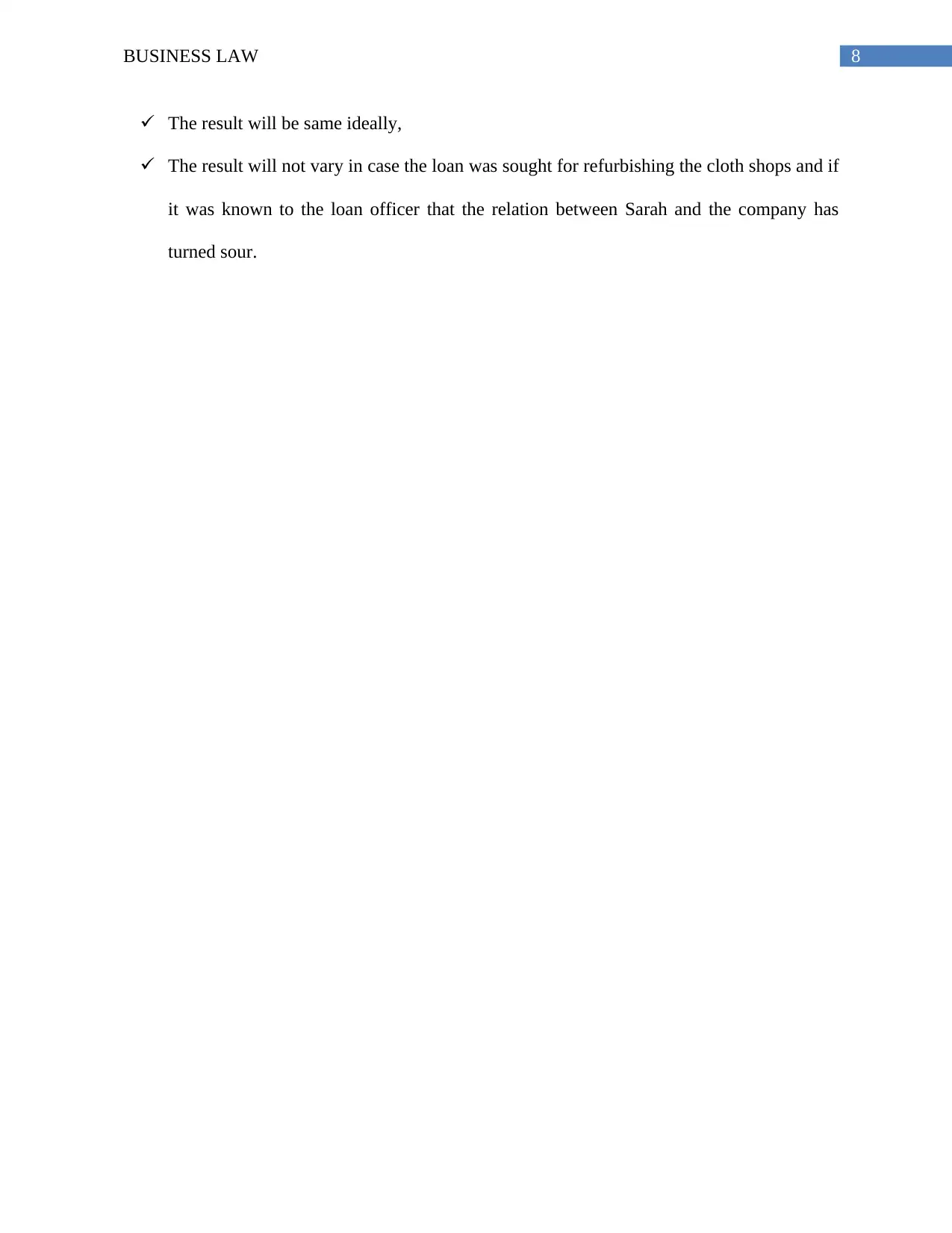
8BUSINESS LAW
The result will be same ideally,
The result will not vary in case the loan was sought for refurbishing the cloth shops and if
it was known to the loan officer that the relation between Sarah and the company has
turned sour.
The result will be same ideally,
The result will not vary in case the loan was sought for refurbishing the cloth shops and if
it was known to the loan officer that the relation between Sarah and the company has
turned sour.
⊘ This is a preview!⊘
Do you want full access?
Subscribe today to unlock all pages.

Trusted by 1+ million students worldwide
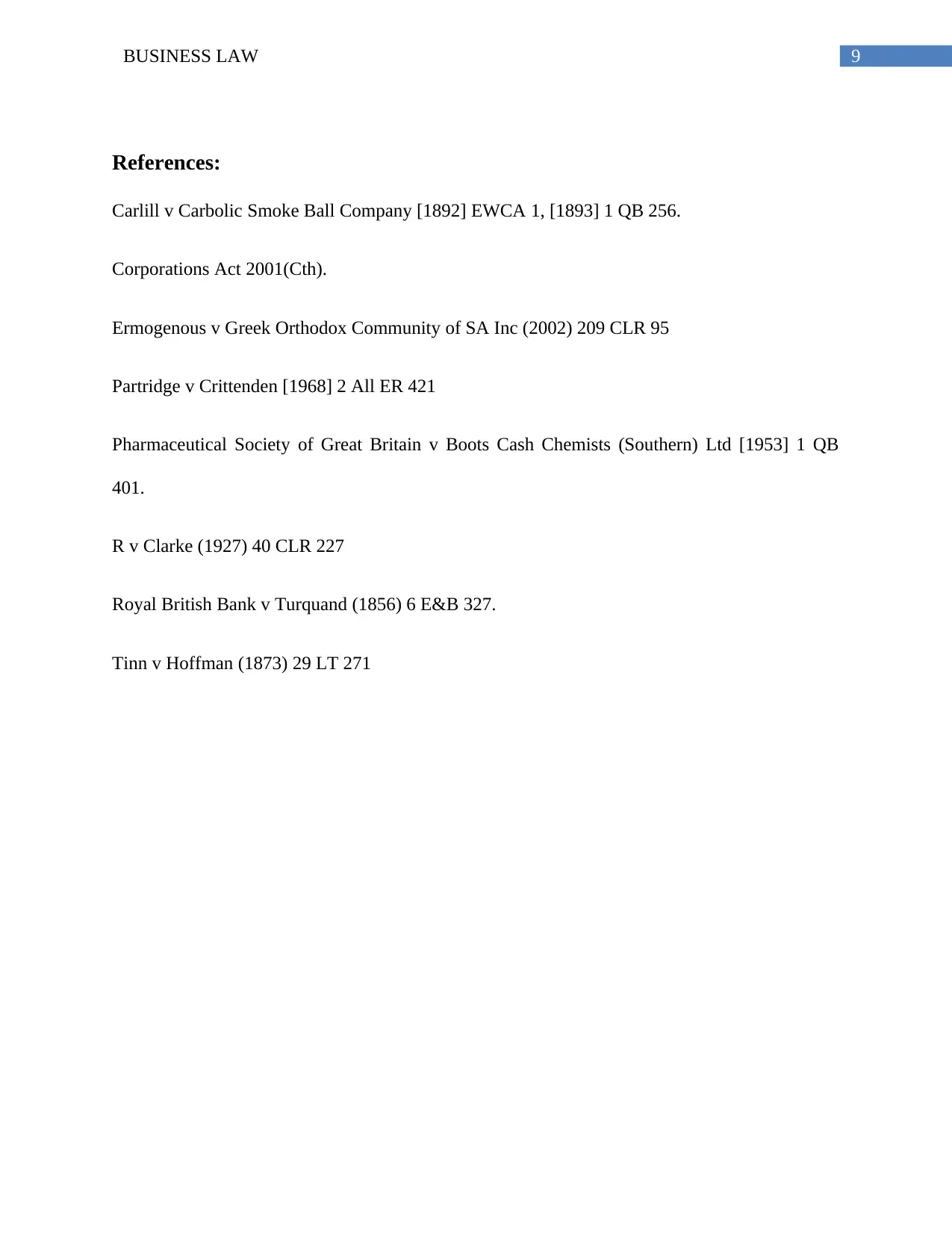
9BUSINESS LAW
References:
Carlill v Carbolic Smoke Ball Company [1892] EWCA 1, [1893] 1 QB 256.
Corporations Act 2001(Cth).
Ermogenous v Greek Orthodox Community of SA Inc (2002) 209 CLR 95
Partridge v Crittenden [1968] 2 All ER 421
Pharmaceutical Society of Great Britain v Boots Cash Chemists (Southern) Ltd [1953] 1 QB
401.
R v Clarke (1927) 40 CLR 227
Royal British Bank v Turquand (1856) 6 E&B 327.
Tinn v Hoffman (1873) 29 LT 271
References:
Carlill v Carbolic Smoke Ball Company [1892] EWCA 1, [1893] 1 QB 256.
Corporations Act 2001(Cth).
Ermogenous v Greek Orthodox Community of SA Inc (2002) 209 CLR 95
Partridge v Crittenden [1968] 2 All ER 421
Pharmaceutical Society of Great Britain v Boots Cash Chemists (Southern) Ltd [1953] 1 QB
401.
R v Clarke (1927) 40 CLR 227
Royal British Bank v Turquand (1856) 6 E&B 327.
Tinn v Hoffman (1873) 29 LT 271
1 out of 10
Related Documents
Your All-in-One AI-Powered Toolkit for Academic Success.
+13062052269
info@desklib.com
Available 24*7 on WhatsApp / Email
![[object Object]](/_next/static/media/star-bottom.7253800d.svg)
Unlock your academic potential
Copyright © 2020–2026 A2Z Services. All Rights Reserved. Developed and managed by ZUCOL.





